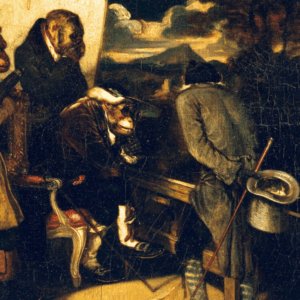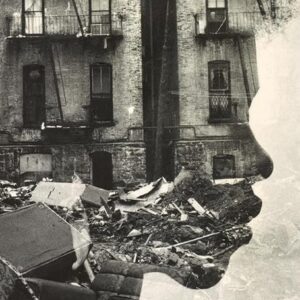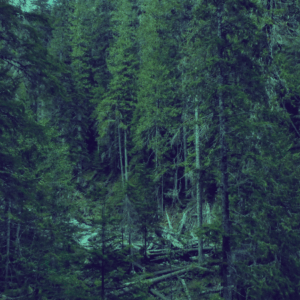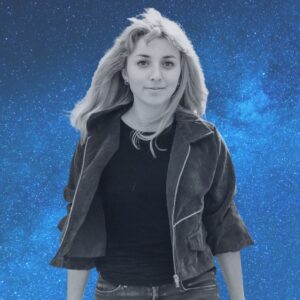TIME CODE 00:10:12
00:10:12 Staring at my face, I’m aware that I want to touch it. Touch the scar on my forehead, the pimple on my chin, rub my nose, my eyes, scratch my cheek. I’m aware that everything looks wrong, my face, my hair, my collar, and I want to fix things. I run my fingers through my hair, pulling it back from my face. It falls forward again like a curtain. It’s trying to shield me from myself. Nice. I’ve spent much of my life hiding behind this curtain of hair.
00:13:02 When I look myself in the eye, it’s hard to look away. Eyes define a face. If we were not such visual creatures, if we received our sensory input some other way, maybe we would not need faces. Trees do not need faces. Jellyfish do not need faces. Daisies do, and they don’t have eyes, so perhaps I am wrong about this.
00:14:37 Still watching the eyes. Sad. Serious. Brown. Slanting downward. The angle of the slope seems more pronounced, more acute than I’d realized. Have my eyes changed? My eyelids are heavier. The folds of skin almost meet the lashes. The right eye and left eye are very different. The left eye looks slightly more Asiatic. The right epicanthic fold is more pronounced, making that eye look more Caucasian. I used to notice this when I put on eyeliner. But here’s something I’ve never noticed before, or at least never admitted: I have a preference. It’s subtle, but I’ve always preferred my right eye to my left. I’ve preferred my Caucasian eye to my Asian eye. Strange.
* * * *
OPTICAL ORIENTATION
When I was growing up, we all knew that Orientals had slanty eyes. We knew that Chinese eyes slanted upwards and Japanese eyes slanted downwards. In school, we used to play a game about this. Putting our fingers in the outside corners of our eyes, we’d push them up and sing Chinee! Then we’d pull them down and sing Japanee! And then, pushing one corner up and pulling the other down, canting our eyes in different directions and making them wonky, we’d holler, Half-n-half! I hollered louder than anyone, because I was the punch line. Everyone knew it, and this made me feel special—a little uneasy and a little bit proud.
Nothing about the joke or the punch line was true, of course. Chinese eyes did not go up, Japanese eyes did not go down, my eyes did not go in opposite directions, and I wasn’t half- Chinee. My father was Caucasian American, of Anglo-Saxon and northern European descent. My mother was ethnically Japanese and had been a Japanese citizen, although by the time I was born she’d become a naturalized American. On my birth certificate, my father’s race is recorded as “white” and my mother’s race as “yellow.”
I grew up thinking of myself as half-Japanese, although the word “half” used to con se me. Half of what? Which half was which, and how was I divided? Was Japanese the top half or the bottom? Or did the dividing line run diagonally? Once, when I was about ten or eleven, some boys accosted me in a park and asked me if I had a slanty Jap vagina. That confused me, too. I’d never heard the word vagina spoken out loud before.
Growing up in Connecticut, I never thought myself half-white or half-American. White American was the default, so that half never needed to be articulated. White American was not comical or joke-worthy, and there was no need to point fingers at it.
As kids, were we aware of the underlying racism of our games? I think not, or not entirely. We just thought it was funny to distort our faces into caricature, squashing our cheeks and crossing our eyes, making Asian buck teeth, Negro lips, and piggy noses. Our faces were young and pliable, and we stretched and twisted our features like Silly Putty, testing the grotesque plasticity of self. We laughed. We were hilarious. Nobody stopped us. Words like Chinee and Japanee were just part of the postwar lexicon, and somehow we knew they were meant to be comical, while other words, like Chink, Jap, Nip, or nigger were not.
But even though we may not have been fully conscious of the racism of our games, we did understand that racial stereo ping was titillating and a little bit taboo. And as a half, my understanding went deeper. In some preconscious and inchoate way, I felt the precarious instability that comes with the mixing of blood. I understood that identity is fluid, that it exists on a spectrum, and that to some extent, I had a choice about where I fell. So when the kids contorted their faces, although I felt uneasy at being identified with the wonky half-n-half face, I suspect I also felt relieved and even grate l that as a diluted yellow person, the peril I represented was only half what it might be. And so, in order to align myself further with the hegemony and keep the real bad words at bay, I raised my voice and joined the chorus, pulling my eyes out of shape and singing out Chinee… Japanee… The trick, I learned, was to appropriate the punch line.
Here was another game we played: When the first snow dusted the ground, my best friend Jane and I would get long sticks and go out into the street and use the sticks to draw faces. I would draw Japanese faces, and Jane would draw American faces. The game we were playing was World War II, and these faces were our troops. The person with the most troops would win the war. We’d draw our faces in the same way, with a big circle for the head, dots for the nose, and a line for the mouth. Only the eyes were different. Mine were just o slants, slashed quickly in the snow, but Jane had to draw whole little circles for eyes, which took her a lot longer, and since it was a race, she always lost. We’d play until dusk and the entire street was filled with faces and my Japan had won. It never occurred to us that we were rewriting history.
* * * *
TIME CODE 00:17:28
00:17:28 I’ve always felt a bit funny wearing eyeliner, like it’s cheating, a betrayal of who I am, to try and make my eyes look bigger. And mascara, too. I have skimpy Asian eyelashes, so what’s the point?
00:19:02 I’m feeling pretty idiotic right now. This experiment is ridiculous. Narcissistic. Solipsistic. Banal. I don’t want to do it anymore. Isn’t it time for coffee?
00:20:46 Deep breath. Bring the mind back. Try again. Don’t look away. What do I spy now?
Heavy bags under my eyes. Saggy, slightly puffy. Baggage from my dad. I first started noticing them in my late thirties and they horrified me. I didn’t want to look like my dad. Didn’t want to see his reproachful, drooping, disappointed gaze staring back at me every time I looked in the mirror. But there was nothing I could do about it. The bags were there. They were the most conspicuous part of my face. It’s possible no one else noticed them, but I could not look at my face and not see them. I think I started wearing thick-framed glasses around then.
00:24:32 Strange. Just realized that I haven’t paid much attention to the bags for several years now. I mean, I see them when I look, but I don’t obsess about them anymore. What’s changed? Certainly not the bags themselves. If anything, they’ve only gotten worse. Have I just gotten used to them? Or is it that my feelings about my dad have changed? He’s been dead for more than fifteen years now. The grief and anguish I felt at his death have softened, and when I see his eyes in mine, I don’t see reproach or disappointment anymore. Instead of judgment, I see concern, watchfulness, maybe even a kind of compassionate discernment. So this is better, an improvement! I don’t mind meeting him here in the mirror. It’s kind of nice. Hey, Dad. How are you doing?
* * * *
ORIGINAL FACE
What did your face look like before your parents were born?
Zen koans are little allegorical nuggets designed to break your head on. They are ancient Gedankenexperiments, the dogged contemplation of which promises to lead to enlightenment, only unlike Western philosophical thought experiments, koans don’t operate rationally. They are more like no-thought experiments, whose potency lies in their ability to break through rigid, dualistic mental habits and go beyond the limitations of the rational, interpretive mind. Still, the habit of interpretation dies hard, and over the centuries, Zen teachers have written extensive commentaries on the koan literature.
So what does this koan mean? According to the thirteenth-century Zen master, Eihei Dōgen,[*] “your face before your parents were born” is your true face, your originally enlightened buddha nature. A second version of this koan asks, Without thinking good or evil, what is your original face? In essence, the o koans ask the same question: What are you? What is your true self, your undivided nature? What is your identity before and beyond these kinds of dualistic distinctions, like father-mother and good-evil, that define us?
I was born in 1956, eleven years after the end of World War II, when Americans were still good, the Japanese were still evil, and a nondualistic understanding was not yet possible. Eleven years prior to my birth, my o halves had been mortal enemies. My mother’s people were killing my father’s people, and vice versa, and at a very young age, I was aware of this enmity and aware, too, that I embodied it. And yet my face evinced its opposite: the force of the attraction— true love, sex, miscegenation, call it what you will—that brought me into being. With all these primal and contrary passions eddying below the surface of my skin, it’s no wonder people found my face disturbing.
In a racially and ethnically segregated society like America in the 1950s and ’60s, there is no way to look at the face of a mixed-race person and not be immediately reminded of sex and difference. The association might be subliminal, but our brains are hardwired for pattern recognition, and when we spot a deviation from the pattern, our instinct is to parse the hows and whys. But thoughts of sex and difference often feel transgressive, especially when occasioned by the face of a child. Mixed-race children make adults uneasy. We make people behave in odd ways.
When I was little, complete strangers used to come up to me on the street and peer into my face and ask, What are you? Curious, aggressive, prurient, or naive, they couldn’t help themselves. They were responding to something in my features that was so existentially unsettling it excused even rudeness, but even so, it was my face that was at fault. In its refusal to resolve into one thing or another, my face was the occasion for their discomfort.
She is nother fyshe nor fleshe, nor good red hearyng.
Half, hybrid, mulatto, chimera… in the uncanny valley, ordinary manners do not apply. Demographics have changed, and now there are many more mixed-race people in the world, but in the 1950s and ’60s, we were more of an anomaly. And identity politics were still emerging, so the language we used was not as skill l, sensitive, or precise. Now people think ice before asking What are you? They find some other way to ask. But back then we had less awareness of the racism inherent in the question, and perhaps a greater tolerance for its clumsiness, too.
My parents never seemed to mind or take offense. They were both linguists, and they understood the human love of taxonomies and our need to identify, classify, and pin down meaning with words.
My dad taught in the Department of Anthropology at Yale, and back then his colleagues were all white men.[†] New Haven didn’t have a large Asian community at the time, and the only Asians I knew were like my mom, the wives of the white, male anthropologists. In fact, it became kind of a joke that in order to get tenure in the Yale Department of Anthropology you had to have an Oriental wife. “Oriental” was what we used to call Asian people back then, and it was mostly the Oriental wives themselves who thought this joke was funny. They formed kind of a strange demographic subset, these exotic Oriental wives of anthropologists, as did we, their half-Oriental, half-anthropological children.
Growing up then, I was both the observer and the observed, both self and other. Half-Asian and half-anthropologist, is it surprising that I should now find myself sitting in front of a mirror, studying my face? The predilection for voyeurism, for this kind of ethnographic introspection, is in my genes.
__________________________________
[*] Dōgen Zenji (道元禅師; also Dōgen Kigen 道元希玄, or Eihei Dōgen 永平道元) (1200–1253), founder of the Sōtō school of Zen Buddhism.
[†] * The first female full professor was hired at Yale in 1970.
From THE FACE. Used with permission of Restless Books. Copyright © 2016 by Ruth Ozeki.













